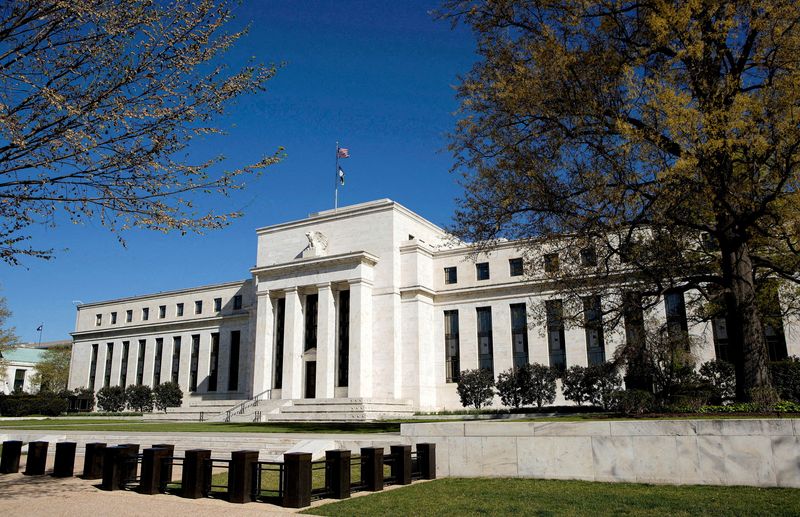(Reuters) - The U.S. Federal Reserve held its benchmark overnight interest rate steady in the 5.25%-5.50% range at the conclusion of its June 11-12 policy meeting.
U.S. central bank officials remain uncertain about the timing of a first rate cut and say they want to see more data confirming that inflation will fall, even if slowly.
Among the key statistics they are watching:
INFLATION (PCE released July 26; next release CPI August 14):
The personal consumption expenditures price index, used by the Fed to set its 2% inflation target, shows inflation slowly subsiding. It fell in June to a 2.5% annual rate, from 2.6% in the prior month.
Core PCE prices, stripped of volatile food and energy costs, remained unchanged in June with a 2.6% reading. Despite that, the data looks set to help Fed officials build more confidence that inflation is moving toward the U.S. central bank's 2% target.
Traders maintained bets on a September rate reduction with an almost 90% probability
On a month-to-month basis, the PCE index rose 0.1% while core PCE prices edged up 0.2%. Officials have begun to pay closer attention to signs of weakening demand in the economy as a precursor to a slowed pace of price increases.
The separate Consumer Price Index released earlier this month fell in June by 0.1%, with drops in both volatile energy items and core consumer goods like vehicles, and weakness in housing costs that Fed officials have long been waiting to see. The 0.2% rise in shelter prices was the slowest since August of 2021 and overall it was the weakest CPI print since May of 2020.
The data pushed the annual rise in consumer prices down to 3% from 3.3% the month before, with the more volatile core index, excluding food and energy, falling to 3.3% from 3.4%.
EMPLOYMENT (Released July 5; next release August 2):
U.S. firms added a greater-than-expected 206,000 jobs in June, but revisions to the prior two months knocked 111,000 positions from the previously estimated number of payroll jobs. That pushed the three-month average total payroll growth down to 177,000, below the level typical before the pandemic and a development likely to be taken by the Federal Reserve as further evidence the job market is slowing.
The unemployment rate rose slightly to 4.1%, the highest since Nov. 2021.
Fed officials have become more comfortable with the idea that continued job growth could still allow inflation to fall, especially if the supply of labor keeps growing and wage growth eases - as it did in June.
The number of people in a job or looking for work grew, and fewer people dropped out of the labor force - both healthy signs that nevertheless pushed up the unemployment rate. Average hourly wages meanwhile rose 3.9% compared to a year ago, versus a 4.1% annual increase in May. The Fed generally considers wage growth in the range of 3.0%-3.5% as consistent with its 2% inflation target.
JOB OPENINGS (Released July 2; next release July 30):
In a sign of the job market's continued strength, the level of job openings rose slightly in May, while the number of open jobs available for each unemployed person remained around 1.22, near where it was in the years before the COVID-19 pandemic.

Fed Chair Jerome Powell has kept a close eye on the U.S. Labor Department's Job Openings and Labor Turnover Survey (JOLTS) for information on the imbalance between labor supply and demand, and the pandemic-era jump to more than 2 to 1 in the number of open jobs for each available worker was emblematic of the time.
Things have cooled substantially. Other aspects of the survey, like the quits rate - unchanged at 2.2 since November - have edged back to pre-pandemic levels in what Fed officials view as an emerging balance between the supply and demand for workers.
